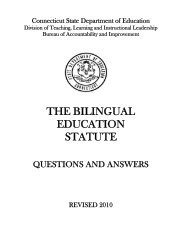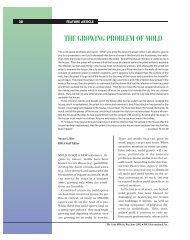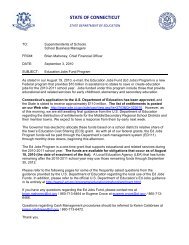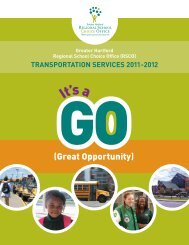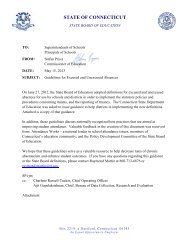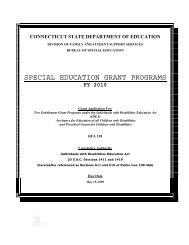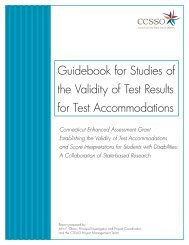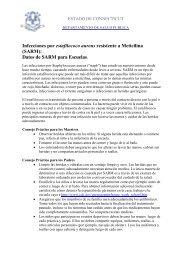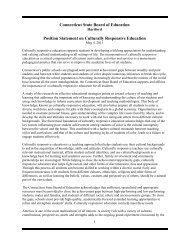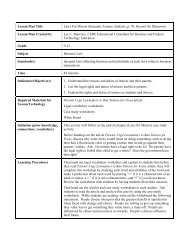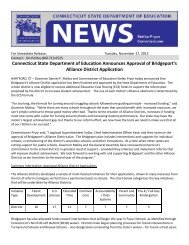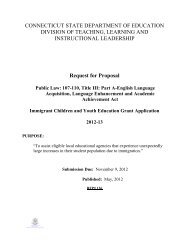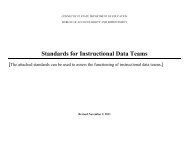Early Childhood - Connecticut State Department of Education
Early Childhood - Connecticut State Department of Education
Early Childhood - Connecticut State Department of Education
You also want an ePaper? Increase the reach of your titles
YUMPU automatically turns print PDFs into web optimized ePapers that Google loves.
Social-Emotional Competence and Family Relations Chapter 10<br />
can be a pivotal force for encouraging<br />
community collaborations that support<br />
a unified vision <strong>of</strong> positive development<br />
for children.<br />
The Six Partnership Standards<br />
And Sample Activities<br />
1. Parenting – Programs promote<br />
and support parenting<br />
skills and the family’s primary<br />
role in encouraging children’s<br />
learning at each age and stage<br />
<strong>of</strong> development.<br />
Activities may include: providing<br />
parent education programs,<br />
transportation, family social<br />
activities, parent rooms and<br />
spaces, on-site Internet access<br />
for family use, social service<br />
referrals, and parent resource<br />
libraries; developing parent<br />
leadership training and parent<br />
support groups; and accompanying<br />
parents to the school district’s<br />
Planning and Placement<br />
Team meetings.<br />
2. Communicating – Staff and<br />
families participate in ongoing,<br />
clear, two-way communication<br />
about the program and<br />
children’s progress.<br />
Activities may include: preparing<br />
parent handbooks and<br />
newsletters; providing audio/<br />
video tapes; maintaining regular<br />
communication through<br />
phone calls, home visits, daily<br />
communication sheets, homeschool<br />
notebooks, or e-mail;<br />
translating all information into<br />
parents’ languages (if parents<br />
speak a language other than<br />
English); and conducting parent<br />
meetings and conferences.<br />
3. Volunteering – programs provide<br />
opportunities and appropriate<br />
training to involve<br />
families in activities both in the<br />
program and at home.<br />
Activities may include: encour-<br />
138<br />
aging and supporting parents<br />
to volunteer to telephone other<br />
parents when needed, construct<br />
playground equipment,<br />
assist in the classroom or library,<br />
coordinate other volunteers,<br />
assist in planning activities,<br />
act as “buddies” for new<br />
parents, raise funds, lobby, and<br />
share talents, hobbies and interests<br />
with children and other<br />
parents.<br />
4. Learning at home – programs<br />
help families engage in learning<br />
activities at home that are<br />
coordinated with the goals and<br />
objectives <strong>of</strong> the educational<br />
program.<br />
Activities may include: providing<br />
book and activity bags<br />
to use at home; gathering information<br />
about educational<br />
activities in the community,<br />
including ideas in the newsletter<br />
for extending classroom<br />
learning at home; loaning parent<br />
resource and informational<br />
materials; making home visits;<br />
creating opportunities for parents<br />
to share ideas with other<br />
parents; and encouraging parents<br />
to be role models for lifelong<br />
learning.<br />
5. Decision making – programs<br />
provide opportunities for<br />
all families to develop and<br />
strengthen their leadership role<br />
in program decisions through<br />
participation in parent organizations,<br />
advisory councils,<br />
school boards, or other decision-making<br />
committees or<br />
groups.<br />
Activities may include: involving<br />
parents in curriculum development;<br />
inviting parents<br />
to staff meetings; including<br />
parent participation in staff<br />
interviewing committees; supporting<br />
parents to advocate for<br />
the program with funders or<br />
policy-makers; asking parents



